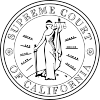| People v. Diaz | |
|---|---|
 | |
| Argued October 5, 2010 Decided January 3, 2011 | |
| Full case name | The People v. Gregory Diaz |
| Citation(s) | 51 Cal. 4th 84; 244 P.3d 501; 119 Cal. Rptr. 3d 105; 2011 |
| Case history | |
| Prior history | Review granted, California Court of Appeals decision unpublished |
| Holding | |
| Affirmed the judgment of the Court of Appeals denying motion to suppress evidence obtained without warrant from Diaz's cell phone upon lawful custodial arrest. | |
| Court membership | |
| Chief Justice | Joyce L. Kennard (Acting) |
| Associate Justices | Kathryn Werdegar, Ming Chin, Marvin R. Baxter, Carol Corrigan, Ronald M. George, Carlos R. Moreno |
| Case opinions | |
| Majority | Chin, joined by Baxter, Corrigan, George |
| Concurrence | Kennard |
| Concur/dissent | Werdegar, joined by Moreno |
| Laws applied | |
| U.S. Const. Amend. IV | |
Overruled by | |
| Riley v. California, 573 US ___ (2014) | |
People v. Diaz, 51 Cal. 4th 84, 244 P.3d 501, 119 Cal. Rptr. 3d 105 (Cal. January 3, 2011) was a Supreme Court of California case, which held that police are not required to obtain a warrant to search information contained within a cell phone in a lawful arrest.[1] In a sting operation conducted by local police, the defendant, Gregory Diaz, was arrested for the sale of the illicit drug ecstasy and his cellphone, containing incriminating evidence, was seized and searched without a warrant. In trial court proceedings, Diaz motioned to suppress the information obtained from his cellphone, which was denied on the grounds that the search of his cellphone was incident to a lawful arrest. The California Court of Appeal affirmed the court's decision and was later upheld by the California Supreme Court.[2] In 2014, the United States Supreme Court overruled that position in Riley v. California and held that without a warrant, police may not search the digital information on a cellphone that has been seized incident to arrest.[3]
- ^ Minkevtich, Hannah (February 23, 2011). "People v. Diaz: Is Your iPhone Constitutionally Protected?". Berkeley Technology Law Journal Bolt. Retrieved March 18, 2012.
- ^ Cite error: The named reference
SCDecisionwas invoked but never defined (see the help page). - ^ Cite error: The named reference
Rileywas invoked but never defined (see the help page).